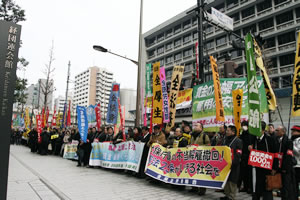1,100 people take to the streets at the start of 2013 Spring Struggle
 The National Confederation of Trade Unions (Zenroren), the National Joint Spring Struggle Committee, and the Tokyo Joint Spring Struggle Committee organized a series of actions on January 22 to mark the start of the 2013 Spring Struggle. A total of 1,100 people from Tokyo and neighboring prefectures held their action in front of the Health, Labor and Welfare Ministry (HLWM), a lunch hour demonstration through the Marunouchi business district of central Tokyo, and at the Japan Business Federation (Keidanren) headquarters. The National Confederation of Trade Unions (Zenroren), the National Joint Spring Struggle Committee, and the Tokyo Joint Spring Struggle Committee organized a series of actions on January 22 to mark the start of the 2013 Spring Struggle. A total of 1,100 people from Tokyo and neighboring prefectures held their action in front of the Health, Labor and Welfare Ministry (HLWM), a lunch hour demonstration through the Marunouchi business district of central Tokyo, and at the Japan Business Federation (Keidanren) headquarters.
At the HLWM, which is considering reducing the amount of welfare benefits, the participants stressed how the job market is deteriorating and criticized the ministry’s planned welfare cut as a measure that will cause a negative spiral in people’s livelihoods. They pressed the ministry to stop considering the welfare cut and called for a minimum wage increase and stable and quality jobs.
At Keidanren, participants demanded that large corporations fulfill their social responsibility, use their internal reserves to raise wages and help in post-disaster reconstruction, and in the revitalization of local economies emphasizing that boosting domestic demand is essential for economic recovery. They also called for opposition to Japan’s participation in the Trans-Pacific Partnership (TPP) free trade talks, for the consumption tax increase to be revoked, and for an end to Japan’s dependence on nuclear power generation.
Declaration of 2013 Spring Struggle
We are launching this year’s Spring Struggle amid rapidly changing political and economic situation.
Nearly 40 percent of the nation’s workers are forced to work as contingent employees. One in four workers is working poor whose earning is under 2,000,000 yen per year. The job market is not improving. While the unemployment rate remains high, heavy workload and excessively long work hours, and unpaid forced overtime work dominate workplaces. Wages have been in decline for 14 years. This has discouraged people from using money, forced many small- and medium-sized businesses into financial difficulty, and led to a decline of the Japanese economy. Recovery from the March 11, 2011 earthquake and tsunami in northeastern Japan has not made progress. Compensation for damages caused by the nuclear accident at Fukushima Daiichi and the radiation decontamination process are too slow, making it impossible for 360,000 people to return to their hometown.
Export-driven large corporations have been carrying out their “restructuring” strategy through dismissing many workers. They have decreased their international competitiveness by destroying their manufacturing base. At the same time, they are amassing more internal reserves and devoting themselves to overseas investment and speculative investment. While unilaterally asking workers to accept the principle of self-responsibility, they are demanding that the government help them reduce the costs through corporation tax cuts, ease regulation on corporate activities, and adversely reform social security programs. Japan has 1.82 million wealthy people with more than 1 million dollars in investable asset. The number puts Japan in second place only after the United States. What large corporations are demanding is tantamount to further widening the income gap, leading to even higher concentration of wealth in the hands of a tiny number of people.
Late last year, a coalition of the Liberal Democratic and New Komeito parties took power. The new administration led by Prime Minister ABE Shinzo is forcing the people, in particular working people, to endure the burden of its policy of giving priority to defending the interest of the business sector and large corporations by returning to the “neoliberal structural reform policies. On the agenda of the Abe administration are a consumption tax increase, the adverse revision of social services, Japan’s participation in the Trans-Pacific Partnership free trade talks, the promotion of nuclear power generation, the exercise of a right of collective self-defense, and even the adverse revision of the Constitution. It was natural that the Democratic Party government was forced out of power because it betrayed the will of the people. But the same political forces that are disconnected from public will rage again.
Local economies and people’s livelihoods are on the verge of collapse. We will fight in work places and local communities to make workers’ voices heard. We will join forces with broad sections of the people. We are struggling to make progress in the effort to move away from the present society in which workers and the people are forced to pay the price of defending the interest of a handful of investors and large corporations and build a society that gives priority to defending the livelihoods and rights of workers and the people.
The National Joint Spring Struggle Committee will persist in the Spring Struggle to achieve the demands under the slogan: “Let us change our workplaces, local communities, and politics; let us win wage increase and improvement in employment and livelihoods.”
Let us bring the country out of deflationary recession by winning wage increase, secure employment and jobs, and improvement of social services.
Let us further advance the nationwide movement to stop Japan’s participation in the TPP talks, get the consumption tax increased revoked, achieve an early recovery from the March 11, 2011 disaster, help disaster victims rebuild their lives, and end Japan’s dependence on nuclear power generation for energy.
The National Joint Spring Struggle Committee calls on all workers and people to join the Spring Struggle.
|

